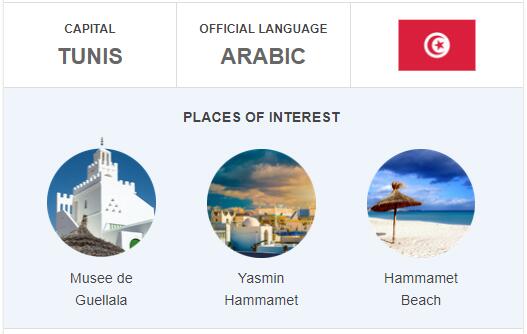According to franciscogardening, Tunisia is located in North Africa and is bordered by Algeria, Libya, and the Mediterranean Sea. It has a population of 11.7 million people and an area of 163,610 square kilometers. The official language of Tunisia is Arabic, though French is widely spoken. The capital of Tunisia is Tunis and the currency used in the country is the Tunisian Dinar. The government type in Tunisia is a semi-presidential republic with a president as head of state and a prime minister as head of government. The economy of Tunisia relies heavily on tourism as well as agricultural exports such as olives, grain, and olive oil. Other industries include textiles and clothing manufacturing, phosphates mining, petroleum production, electronics production, aerospace technology manufacturing, and automotive manufacturing. Tunisia has an excellent education system with both public universities and private institutions offering students a wide range of courses to choose from.
According to Countryaah, about 99% of the population is Sunni Muslims. An Ibadite minority resides in Djerba. Besides smaller Protestant groups, there are approx. 20,000 Catholics in the country. The Jewish minority has been greatly reduced in recent years.
Tunisia was Islamized in the 600s, and throughout history has been a significant Islamic center, both at its Islamic educational sites and because of the pilgrimage city of Kairouan. After the country gained full independence in 1956, Islam was declared the country’s religion; at the same time, the legislation was secularized, the religious courts closed down, and the traditional Islamic educational institutions controlled by the state.

In April 2002, the old Jewish synagogue Ghriba on the island of Djerba became the target of a bomb attack. It was visited this month by Jews from all over the world on pilgrimage. The attack cost many killed – including German tourists. The government first claimed that it was an accident, but later admitted that it was an attack. Authorities placed the responsibility on a Tunisian living in the French new Lyon. Acc. he had been assisted by a family member in Tunisia. Attendance at the Lag B’Omer party at Djerba was significantly lower than in previous years due to the attacks and tensions in the Middle East. About 1000 of Tunisia’s 3000 Jews live in Djerba. However, the traces of the attack were quickly rectified.
At the beginning of 2003, President Ben Alí issued several calls for a peaceful solution to the situation in Iraq and supported the UN Security Council resolutions in this area.
In October, the government condemned Israeli air strikes on Syria and demanded international law to prevent an escalation of violence in the Middle East.
US Secretary of State Colin Powell visited Tunisia in December 2003 to discuss the crisis in the Middle East and to convey an invitation from President Bush to visit the United States in February 2004.
After his capture in December of Saddam Hussein in Iraq called on the Tunisian government that every effort was being put into the country to regain its sovereignty and peace. That same month, Parliament passed an anti-terrorism law and a law against money laundering.
In February 2004, Ben Alí made an official visit to the United States and had several meetings during which bilateral issues were discussed and the situation in the Middle East was discussed.
In 2004, General Habib Ammar was appointed chairman of the organizing committee that plans to hold the World Conference on the Information Society in Tunisia in 2005. Ammar had been the National Guard’s first commander and Minister of the Interior after Ben Ali’s coup. A case was pending against him by the Geneva State Attorney at the request of the World Organization against Torture and the Swiss Association for Impunity (TRIAL). Ammar was accused of turning Tunisia police stations into interrogation and torture centers targeting opposition and journalists.
A few days before the implementation of the Arab summit in Tunisia 29-30. March 2004 this was postponed to enable better preparation among the participating countries. Acc. government officials rescued this decision – due to the situation in the Middle East.
In the October presidential and parliamentary elections, Ben Ali – who had already been in power for 17 years – received almost 95% of the vote. Acc. the opposition was the choice marked by scams. The former general who was considered to have made Tunisia the most stable and prosperous country in North Africa thus secured a fourth presidential term. The Interior Ministry confirmed that he had received 94.49% of the vote.
- Follow abbreviationfinder to see what is the meaning of TS in geography. It can stand for Tunisia. Click this site to see other possible meanings of this acronym.
An independent Tunisian human rights group was not allowed to serve as election observers, but the Arab League had observers at a number of polling stations. The presidential election was the second to be held as a multi-party election since the country’s independence from France.
